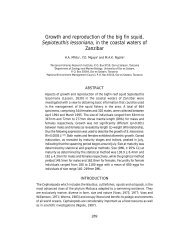gpa_east_africa_case.. - GRID Africa GeoPortal - UNEP
gpa_east_africa_case.. - GRID Africa GeoPortal - UNEP
gpa_east_africa_case.. - GRID Africa GeoPortal - UNEP
You also want an ePaper? Increase the reach of your titles
YUMPU automatically turns print PDFs into web optimized ePapers that Google loves.
water is not safe for human consumption or other uses. The results for the analysis of theriver water showed that the latter is contaminated from all sorts of pollutants including toxicones. Also, vegetables were found to be contaminated by heavy metals.Readings of pollutant loads in discharge stabilization ponds and sea outfalls, off the oceanroad have show high turbidity but rapid dilution of discharges from short distance source andtherefore limited potential impacts on coral growth and mangrove forests. Pollution loadsdischarged at DSM harbour and the Msimbazi creek, generally from longer distance sources,reveal higher pollution loads (Managing sustainable growth and development of DSM bySDP).Wastewater polluted loads affect sequentially the surface and ground water resources used inthe settlements, the nearby rivers and merge into the runoff reaching the coastal area andlater entering into the marine environment. Cumulative health and environmental hazardsemerge as a result of the combined impacts on living conditions and the quality of naturalresources from diverse point sources. Marine pollution is typically the ultimate recipient ofdomestic pollutants in "brown" and "black" wastewater discharged either directly to the sea orindirectly through additional loads from agricultural runoff, sediment and silt and oil wastesfrom industrial effluents.Sea water quality. Measurements made in 1993 of heavy metals and petroleumhydrocarbons content of marine water along the coast of DSM City and rivers entering theIndian Ocean are presented below.Concentration of heavy metals and petroleum hydrocarbons along the Coast, 1993MetalArea<strong>Africa</strong>na HotelbeachKawe beach(Mbezi river)Kawe/MsasaniMlalakuwaMsimbazi bayMsimbazi riverFerry(part area)riverZinc Present Present PresentIron Present Present Present PresentManganase Present PresentOil Present PresentSource: Msafiri M. J. Marine Pollution Studies along Dar-es-Salaam, NEMC, 1993.There was high concentration of Zinc in Kawe beach area and Msimbazi bay where riversMbezi and Msimbazi enter the ocean. This is attributed to the disposal of industrialwastewater into or near the rivers by industries located up-stream.It was also found that at the <strong>Africa</strong>na Hotel Beach, Mlalakuwa and Msimbazi rivers and theDSM Port area, iron concentration was high. High concentration is caused by the wastes fromtourist hotels along the beach, construction sites, workshops, garages and industries locatedupstream along the rivers. High concentration values are also found in Msimbazi bay (mouthof Msimbazi river) and the Port areas due to the discharge of industrial wastes up-streamalong Msimbazi river adding to the wastes from anchored vessels, ships and boar repairactivities in the Port area.October 1999 NEMC conducted an industrial monitoring program for selected categories of13 industrial sector within the city. The analysis of pollutant concentration in the dischargedwastewater to the receiving bodies showed that:• Oxygen depletion in receiving water (rivers and storm water drainage)• Suspended solids• Presence of toxic substances (heavy metals)• High organic loads from on-site wastewater septic disposal tanks.The Fisheries Sector. Fishing is very important in DSM for employment, family food supplyand for animal feed. Fishing methods include freshwater fishing, marine fishing, dynamitefishing and beach seine. Freshwater fishing is mainly for household consumption. Few lakesand ponds are used for inland fisheries resources in Mikocheni, Kawe, Kimara, Tegeta, Boko,Final Draft Report – Cost Benefit Case StudiesGPA Strategic Action Plan on Sewage, October, 200085


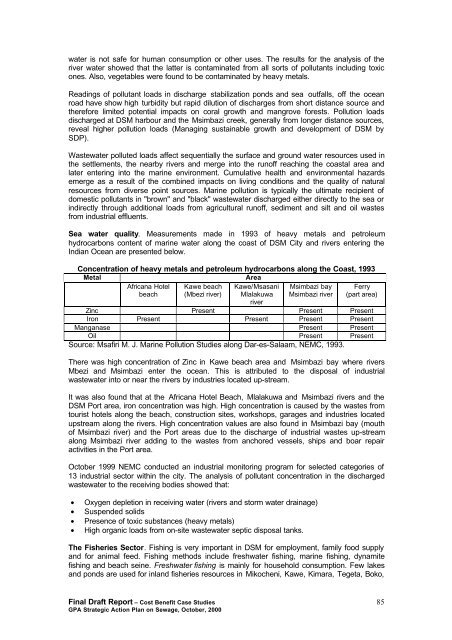
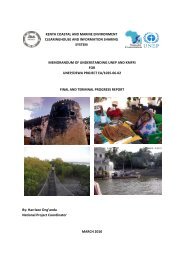
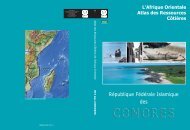
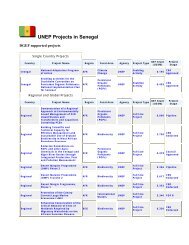

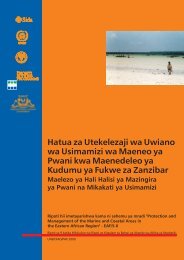
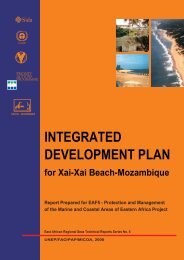
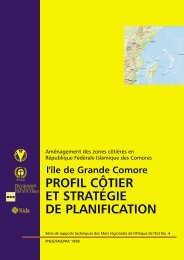
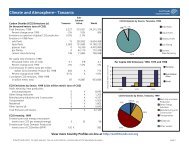
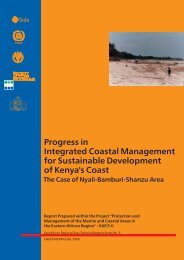
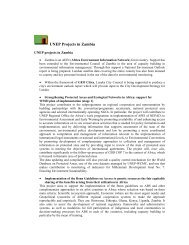
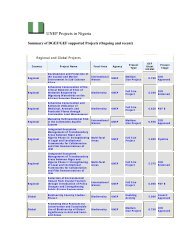
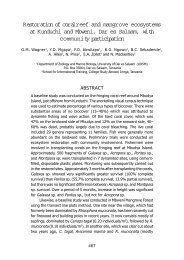
![Please Click to download [English] - GRID Africa GeoPortal - UNEP](https://img.yumpu.com/30633391/1/184x260/please-click-to-download-english-grid-africa-geoportal-unep.jpg?quality=85)
